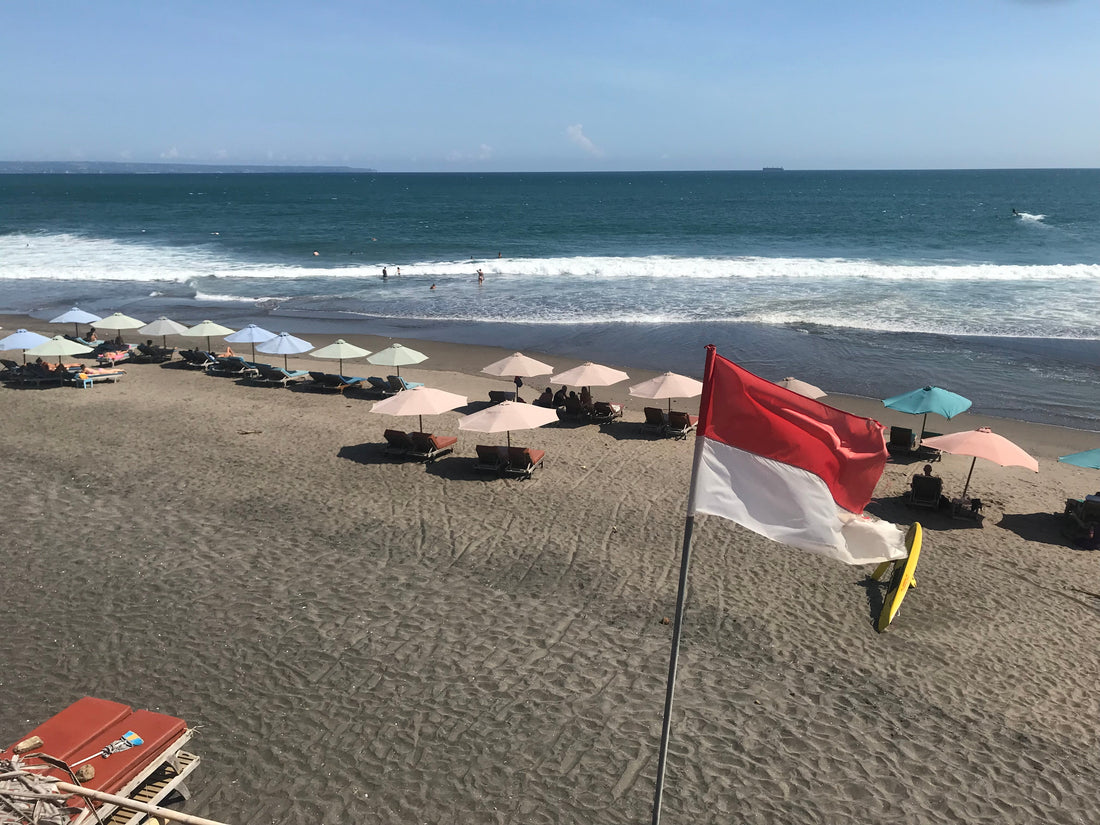1. A Historic August
This August marks a powerful moment in history — the 80th anniversary of Indonesia’s independence.
On August 17, 1945, just two days after the end of World War II, Indonesian leaders Sukarno and Mohammad Hatta declared independence from over 300 years of colonial rule. For me, as a Japanese woman deeply connected to Indonesia through my work with Balinese artisans, and as the granddaughter of a World War II survivor, this date holds personal and emotional weight.
This isn’t just about flags or politics.
It’s about the human cost of war.
And the quiet strength of freedom.

2. My Grandmother’s War
My grandmother is now 92 years old.
When the war ended in 1945, she was just a 12-year-old girl growing up in Kagoshima, Japan.
As a child, I was incredibly close to her — and from an early age, I heard her stories. Not from textbooks, but from her own soft, steady voice. Stories of fear, hunger, and unimaginable courage.
She told me how her education was disrupted when she was sent to help build an airfield.
She told me about walking home from school with her friend when a B-29 bomber flew overhead — how they dove into the side of a rice field to hide, their small bodies trembling in the grass.
She told me about the first air raid in her hometown, on March 18, and how she and her family ran to the bomb shelter — terrified, while her own grandfather sat calmly on the veranda watching the enemy planes, a quiet and unshakable presence.
These weren’t just stories. They were memories etched into my identity.
They shaped how I view war.
Maybe that’s why I’ve always felt a deep, almost visceral opposition to it.

This photo was likely taken within five years of the war’s end — a time when Japan was still rebuilding, both physically and emotionally.
3. Indonesia’s Path to Independence
While Japan was mourning defeat and rebuilding from the ashes, something else was happening just two days later — thousands of kilometers away.
On August 17, 1945, Indonesia declared its independence from the Netherlands.
For more than 300 years, Indonesia had been under Dutch colonial rule. But in 1942, during World War II, Japan invaded and occupied the archipelago, pushing out the Dutch.
Japan’s occupation was far from peaceful. It brought hardship and suffering.
But it also unintentionally created conditions that helped fuel the Indonesian independence movement.
For the first time, many Indonesians gained military training, political organization, and a taste of leadership. When Japan surrendered on August 15, it created a moment of power vacuum — and Indonesian leaders acted fast.
On August 17, they proclaimed their freedom.
It was bold. It was risky. And it was historic.
But independence wasn’t granted overnight. The Dutch tried to reclaim their colony, sparking years of armed conflict. It wasn’t until 1949 that Indonesia’s independence was formally recognized.
4. Japan and Indonesia: A Complicated Connection
As someone with roots in Japan and years of connection to Indonesia — both personally and professionally — I often reflect on the deep ties between our two countries.
It’s true that our shared history includes painful chapters. Japan’s occupation of Indonesia during World War II left wounds on both sides. Japan itself suffered immense trauma — cities destroyed, lives lost, and generations marked by the aftermath of war.
But in the decades since, our nations have worked to rebuild not just themselves, but a relationship grounded in cooperation, respect, and mutual inspiration.
I witnessed this firsthand when I lived in Jakarta and worked for a Japanese real estate developer. Every day, I saw Japanese and Indonesian teams collaborating — in construction sites, business meetings, and cultural exchange. It amazed me how many local people spoke of Japan with admiration. Their words, filled with warmth, made me feel proud and hopeful.
Beyond infrastructure and business, there are cultural echoes that quietly link us.
In Indonesia, tofu is called “tahu”, and the beloved tempeh is a fermented soybean product — much like Japan’s natto. These little parallels — in food, values, and community — remind me that our connection is not only strategic, but deeply human.

When Jakarta’s MRT system first opened, I visited Bundaran HI — a central station built with the support of Japanese companies. The excitement was palpable: people taking selfies, kids laughing, and families experiencing the train for the first time.
5. Freedom is Still Being Woven
At Umah Decor, we share handmade goods created by artisans in Bali — most notably, Ata pieces that have been passed down through generations.
Each item is made slowly, intentionally, and with respect for tradition.
One of our signature items — a bamboo box embroidered with beads — is based on ceremonial offering boxes used in Balinese Hindu rituals.
They aren’t just beautiful objects. They’re vessels of prayer, purpose, and peace.
And I believe that in a world still filled with conflict,
choosing to honor craftsmanship, culture, and connection is a quiet — but powerful — act of freedom.
Freedom isn't always loud.
Sometimes, it's woven.

6. A Personal Prayer for Peace
As we mark 80 years since Indonesia declared its independence, I carry my grandmother’s voice in my heart.
Her stories remind me that war leaves long shadows.
But they also remind me that resilience is inherited, and that freedom — once fought for — must be protected with care.
When I see the hands of Balinese artisans bringing life to Ata fibers, I see more than skill.
I see the future of a culture that has endured.
And I feel honored to play a small role in helping it thrive.
“May we never forget what it took to be free —
and may we continue to honor that freedom with care, respect, and connection.”


